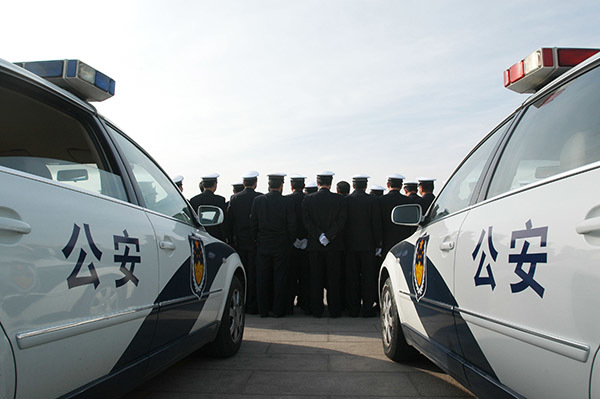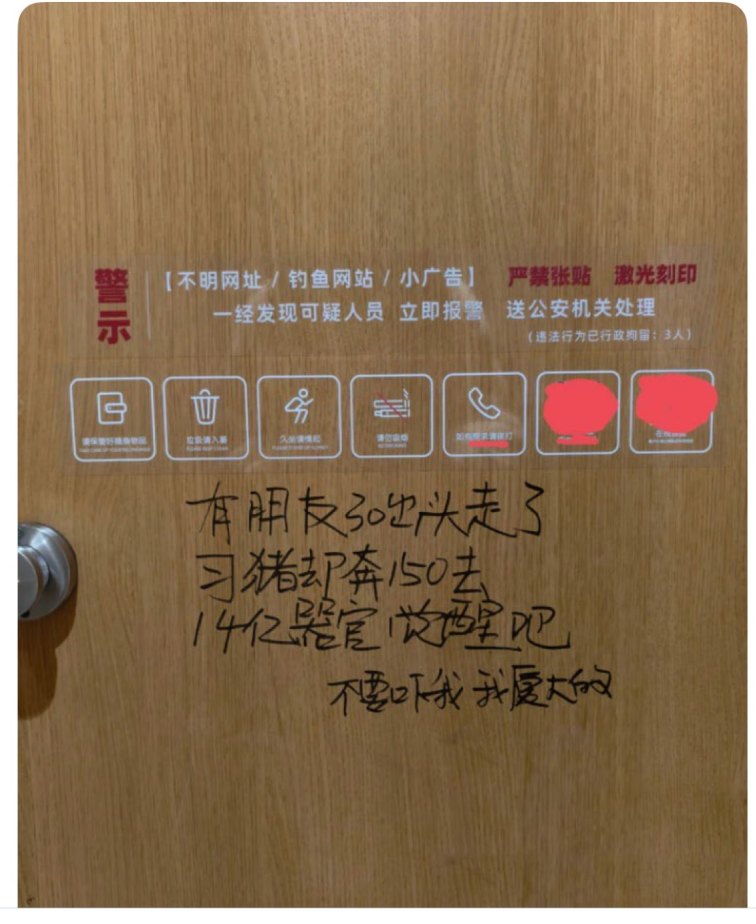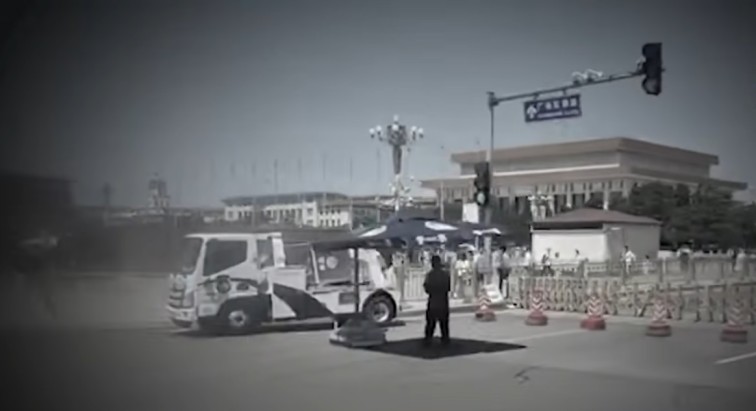Before the 20th Party Congress’s Fourth Plenary Session, a large number of various types of military vehicles appeared on highways near Baoding, Hebei Province. (Video screenshot)
[People News] On September 29, the CCP announced it will hold the Fourth Plenary Session of the 20th Party Congress in Beijing from October 20 to 23. Because this meeting involves senior CCP personnel and power distribution—including whether Xi Jinping will step down to a secondary position—it has drawn intense outside attention. At this sensitive moment, multiple netizens revealed they saw large numbers of military vehicles on highways and roads near Baoding, Hebei, suspected to be heading toward Beijing. Meanwhile, a mysterious rocket appeared in the skies above Beijing’s Western Hills.
The Fourth Plenum Faces a Complex Situation
According to CCP state media reports, at a Politburo meeting on September 29, the Politburo heard a report on the so-called solicitation of opinions regarding the draft “Recommendations of the CCP Central Committee on Formulating the 15th Five-Year Plan for National Economic and Social Development.” It was decided that after revisions based on this meeting, the draft would be submitted to the Fourth Plenary Session for review. The meeting also decided that the Fourth Plenum will be held in Beijing from October 20 to 23, and discussed other matters.
Because of fierce power struggles in the CCP leadership over the past two years, many high-ranking military officers and government officials have fallen in a sweeping purge, including many of Xi Jinping’s close allies. Their whereabouts remain unknown after their downfall. For example, former Commander of the People’s Armed Police, General Wang Chunning, and former Minister of the Logistics Support Department of the CMC, Lieutenant General Zhang Lin—both 20th Central Committee members—have been stripped of their NPC delegate positions, and their expulsion from the Party is expected to be confirmed at the Fourth Plenum.
Even Xinhua reported that the continuous purge of “toxic influences” in the PLA has led to a “rare in decades serious shortage” of senior officers. The number of generals is “pitifully few,” and the CMC members have shrunk from 7 to 5 or even 4. How to adjust the military personnel layout is highly complex.
Under such circumstances, outsiders even suspect the purge has already weakened the military’s combat capability.
Will Xi Step Down?
Of course, what the outside world is most focused on at the Fourth Plenum is whether Xi Jinping will step down, or relinquish some power—questions expected to be answered there.
AP analysis suggests Xi may step aside.
The AP report noted that recently, Premier Li Qiang attended and spoke at the 80th UN General Assembly in New York, while Xi did not attend. This indicates Xi is “stepping back.”
The report argued this shift is the latest example of Xi reducing overseas trips and delegating tasks to loyal subordinates, pushing Li Qiang into a more prominent role.
Thomas, a China politics researcher at the Institute for Asian Social Policy, said Li Qiang may become the key interlocutor for foreign governments and businesses engaging with Beijing.
Large Numbers of Military Vehicles Heading to Beijing?
Just as the Fourth Plenum was being hotly discussed, on September 28, several netizens reported seeing large numbers of military vehicles near Baoding, Hebei, including troop carriers, armoured vehicles, supply trucks, and medical vehicles.
Since the CCP positions the PLA as a tool to maintain its dictatorship and suppress the people, the PLA is not a national army but the Party’s guard. Therefore, whenever fierce infighting occurs within the top leadership, the Party Guard Army is mobilised to maintain control.
Public information shows Baoding, Hebei, is home to the CCP Central Theatre Command’s 82nd Group Army, which is also the personal force of CMC Vice Chairman Zhang Youxia. On the eve of the Fourth Plenum, the 82nd Army appeared in large numbers, suspected of heading to Beijing. This move is seen as evidence of fierce internal struggles in Zhongnanhai. Perhaps fearing a loss of control and sudden incidents, they urgently deployed the 82nd Army to Beijing to stabilise the situation.
In addition, on the evening of September 30, a netizen posted a video showing a mysterious bright spot with a long tail streaking across the sky over western Beijing, leaving behind a “rocket cloud.” Some netizens asked curiously: What exactly happened in Beijing’s Western Hills? Since none of China’s four land-based space launch centres are near Beijing, what rocket was this?
U.S.-Japan-Korea Cooperation, CCP Sidelined
At home, the CCP is troubled not only by long-term economic stagnation and persistently high unemployment, but also diplomatically. Formerly China-friendly Japan and South Korea have now clearly moved closer to the U.S., which may further trouble the CCP.
According to Deutsche Welle Chinese, on August 25, South Korean President Lee Jae-myung met U.S. President Trump at the White House. Lee said only Trump can achieve peace on the Korean Peninsula. Trump said he hopes to meet Kim Jong-un again this year. Their talks indicated that future Korean Peninsula peace negotiations will be led by the U.S. and South Korea, excluding the CCP.
In terms of U.S.-Korea defence cooperation, Trump did not directly respond to whether U.S. troops in Korea would be reduced, but hinted that South Korea should transfer ownership of U.S. base land. On trade, the U.S. and South Korea smoothly reached an agreement in July.
According to Japan’s Sankei Shimbun on September 23, the Trump administration’s soon-to-be-released new “National Defence Strategy” (NDS) lists “preventing China from taking control of Taiwan” as one of its top two priorities.
According to Taiwan’s Central News Agency on September 24, former U.S. Defence Department policy adviser of Japanese descent, Toshii Yoshiwara, recently told Sankei Shimbun that the Trump administration’s upcoming new defence strategy emphasises deterrence against a CCP invasion of Taiwan and will also require Taiwan to strengthen its national defence.
Xi Jinping urgently seeks to seize Taiwan for historical legitimacy, but with U.S.-Japan close cooperation on the Taiwan issue, the CCP’s dream of forcibly unifying Taiwan becomes unattainable.
For the CCP, this autumn is full of troubles—domestic and international.
Independent commentator Du Zheng previously wrote that since the Third Plenum last July, rumours about Xi Jinping’s health crisis and weakening power have run rampant, sparking discussion about the possibility of Xi retiring at the Fourth Plenum or the 21st Party Congress. After Xi entered his third term, misrule has driven the economy intoa severe crisis and intensified political tension in Beijing. Both the Party and Xi himself have become targets inside and outside the system. Anti-Xi, anti-CCP sentiment has become mainstream public opinion in China.
(First published in People News) △










News magazine bootstrap themes!
I like this themes, fast loading and look profesional
Thank you Carlos!
You're welcome!
Please support me with give positive rating!
Yes Sure!